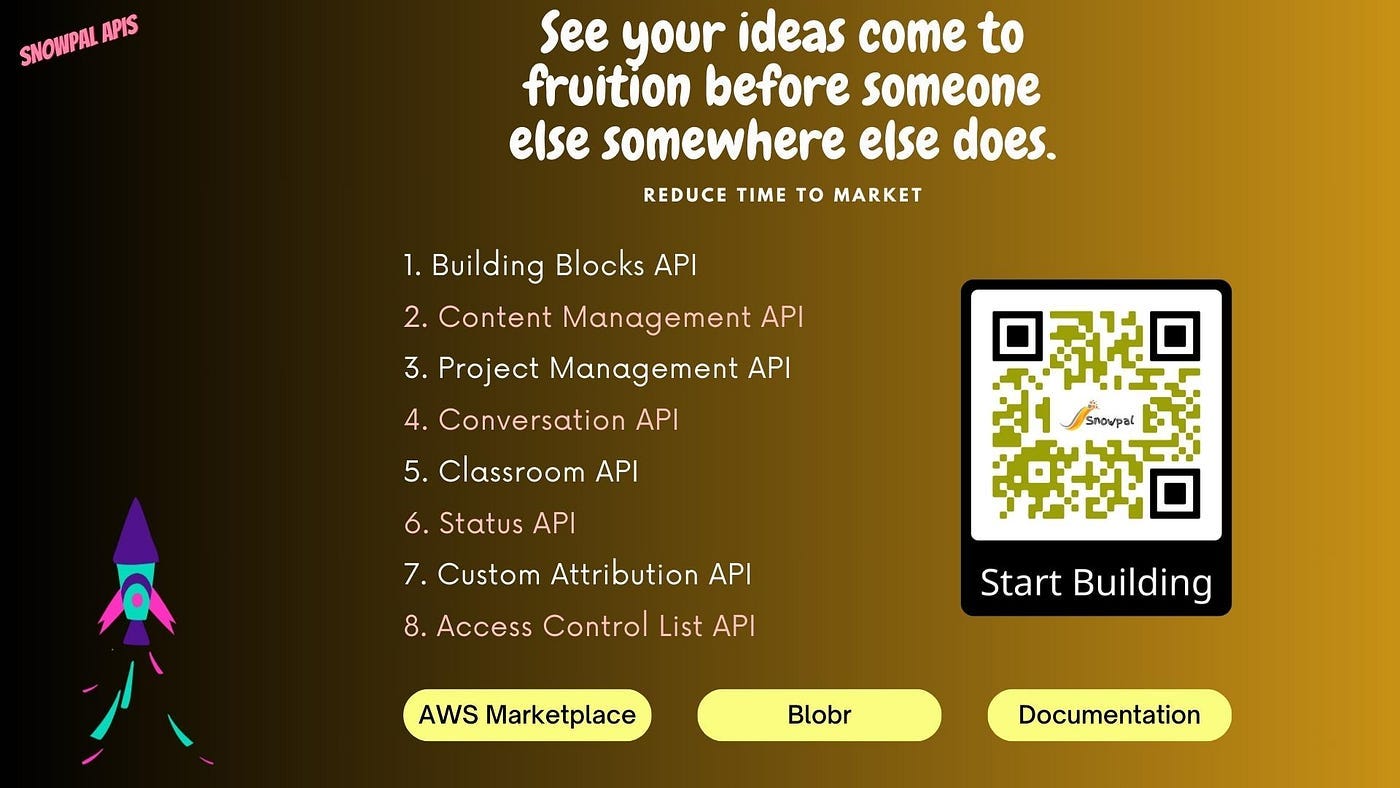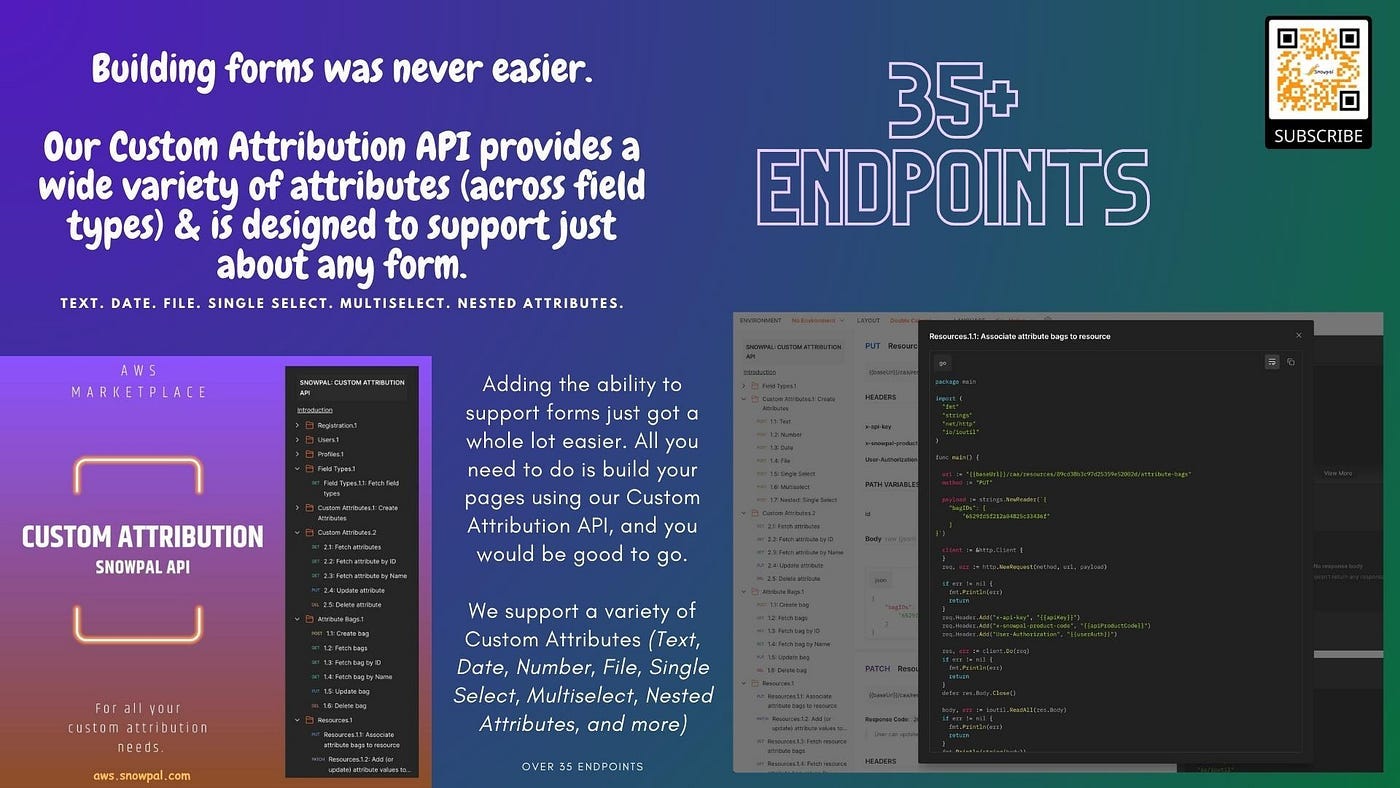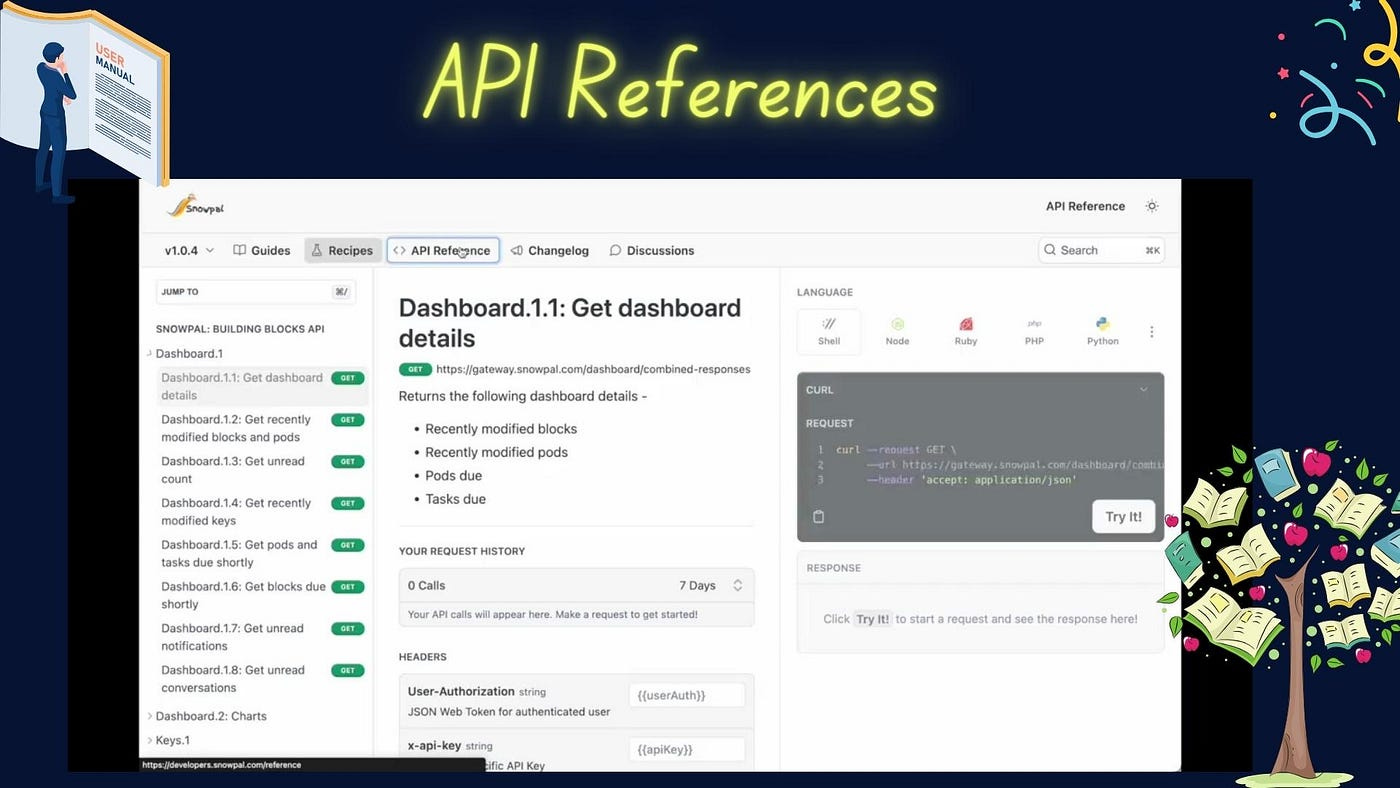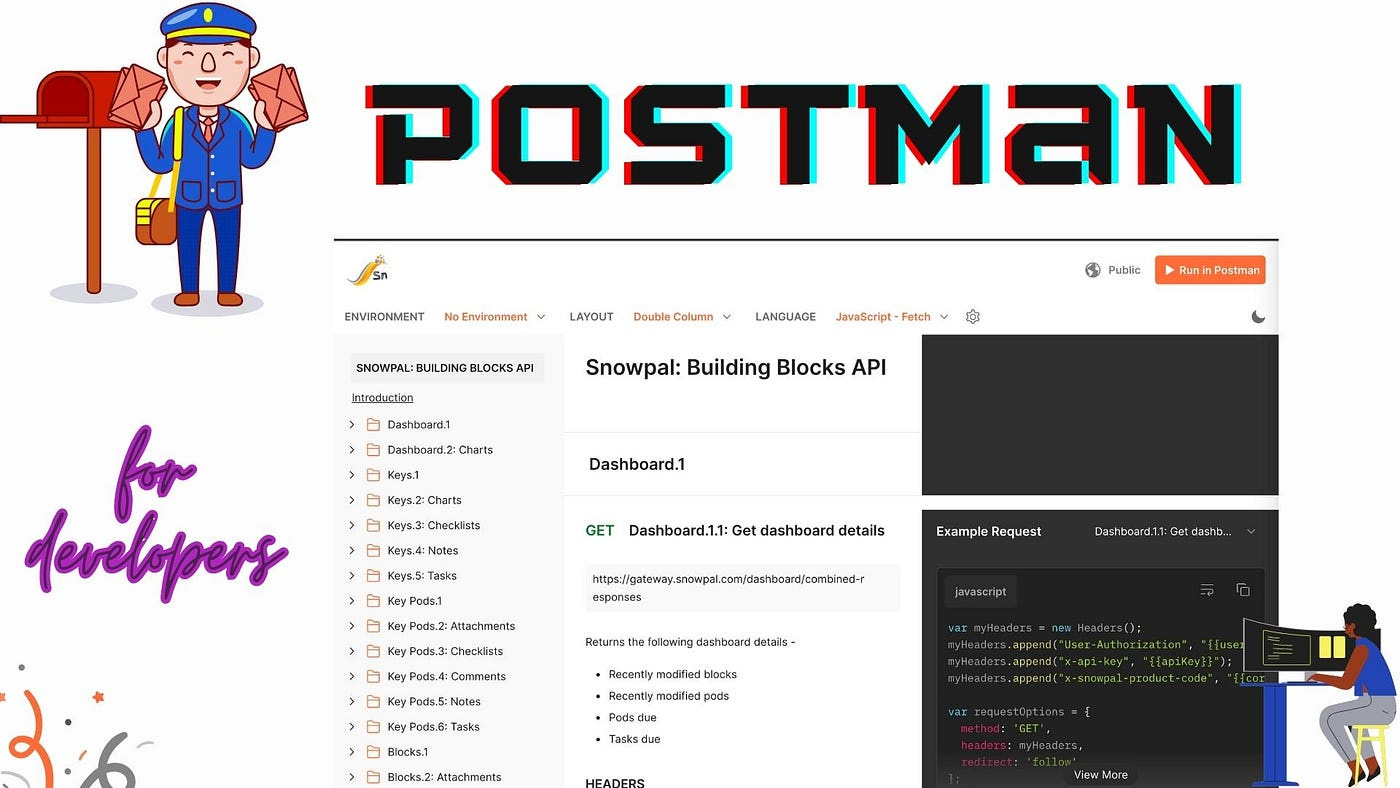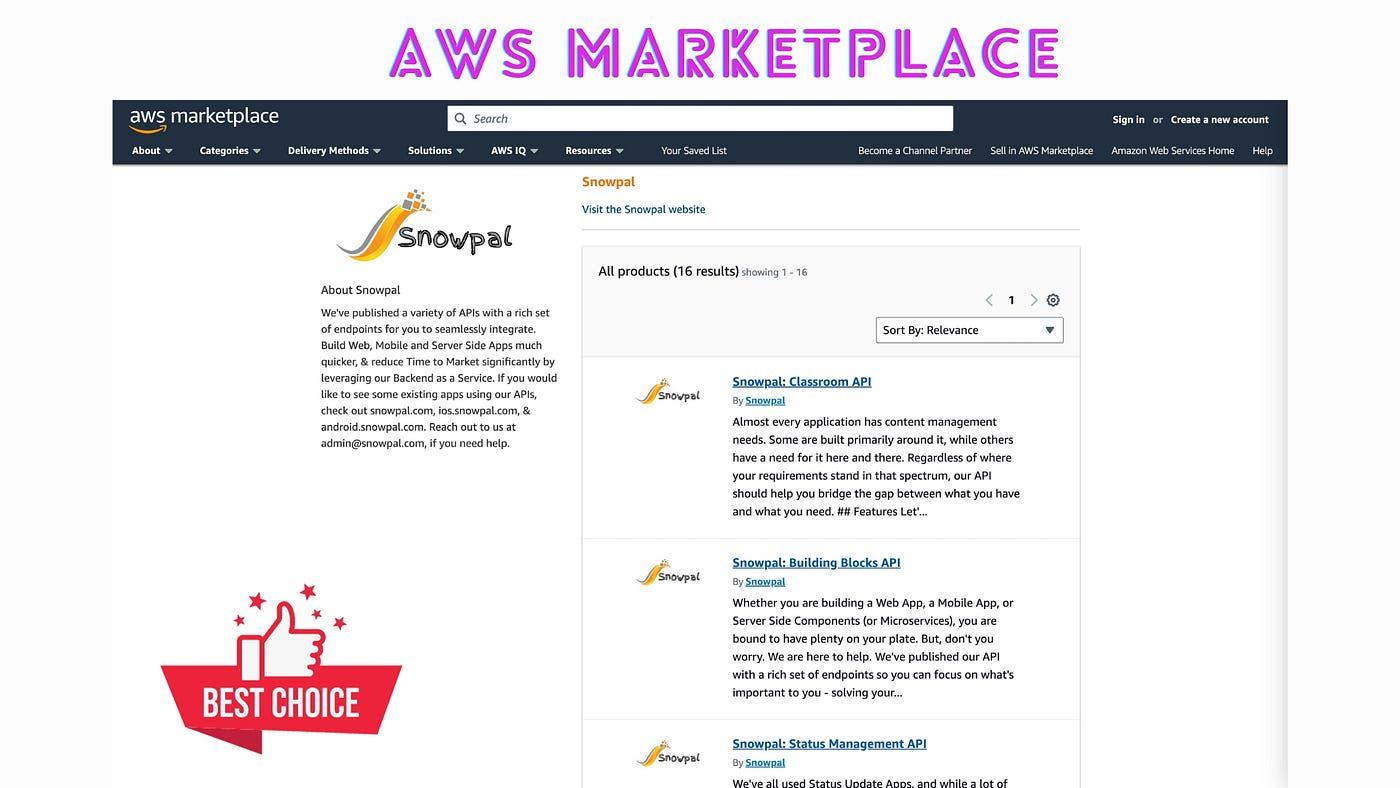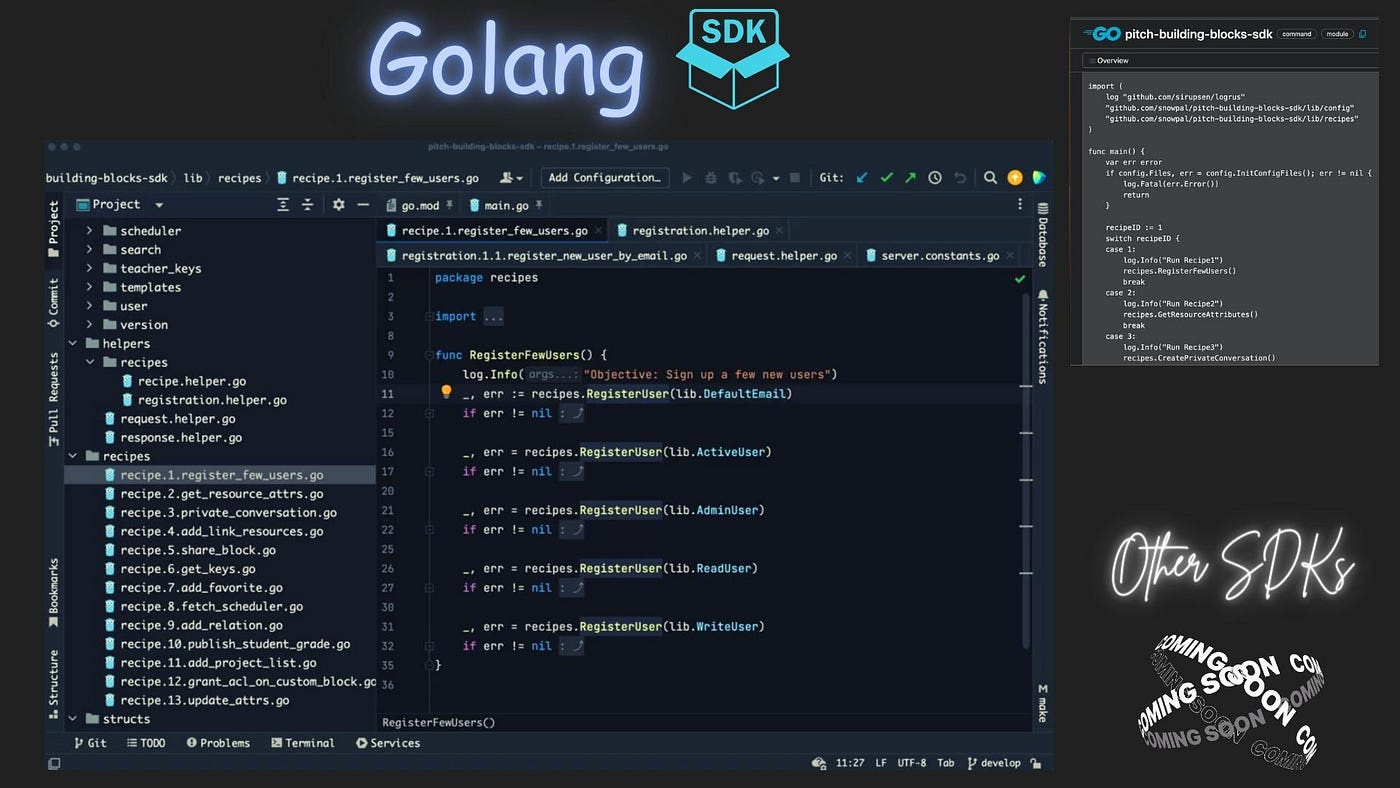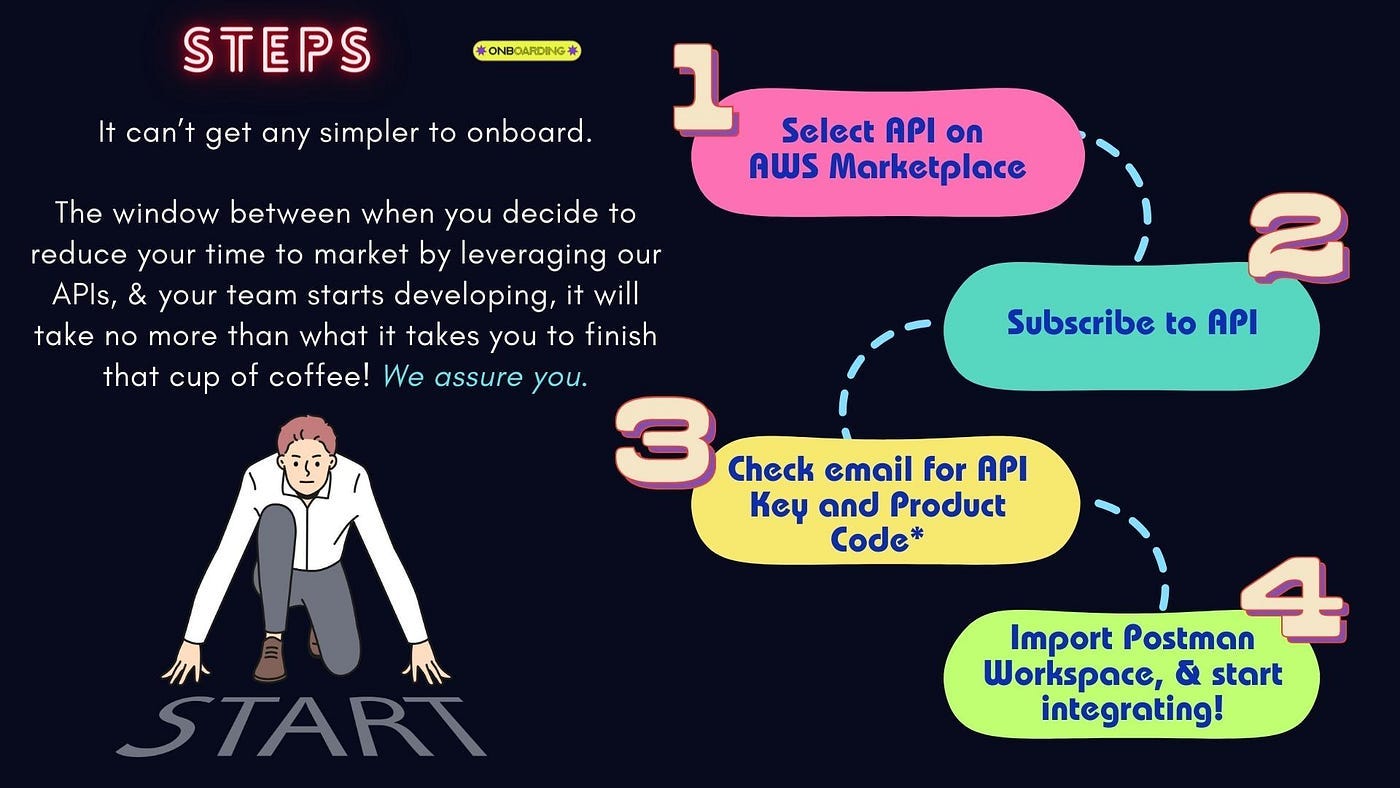Table of Contents
Introduction
API Menu
Building Blocks API
Content Management API
Project Management API
Classroom API
Conversation API
Status API
Custom Attribution API
Access Control List API
API Documentation
API Guide
API References
Postman
AWS Marketplace
Golang SDKs
Onboarding Process
Professional Services
Existing Customers
Conclusion
1. Introduction
Let’s take a quick look at some of the APIs offered by Snowpal. We are a Backend as a Service provider, and our intent is to do most (if not all) of the backend heavy lifting for you so you can focus on your core customer problems. Whether you are building a Web App, Mobile App or Server Side Apps, you can leverage our APIs to reduce your Time to Market significantly.
2. API Menu
Here’s a list of our APIs in production, and this list is constantly growing. If you are looking for a foundational API that is industry agnostic, and maps seamlessly to your business needs, you can start with our Building Blocks API. And when you need more specific APIs, you can go with one of the others (like Content Management or Project Management APIs).
EdTech providers will find a lot of value in our Classroom API, while our Conversation API plugs in nicely into any system adding support for Private and Group Conversations.
Status API is meant for systems that deal with Status Management (think Slack Status Update Apps, for instance), while our Custom Attribution API provides a wide variety of attributes (across field types) & is designed to support just about any form.
Access Control List API is designed to help you secure your apps without you having to worry about the nitty gritty details of Access Control. You can create custom Privileges, Roles, Associate Privileges to Roles, Adding Members to Teams, Grant Privileges to Members & Teams, Grant Roles to Members & Teams, and more.
You can mix and match our APIs and Endpoints so subscribe to one or all to leverage the collective value of all our APIs.
3. Building Blocks API
The very first API we designed and implemented is the Building Blocks API, and it does what its name literally says — it serves as Building Blocks for just about any system you are looking to build.
Perhaps, you are getting started on a greenfield project that needs a robust API that satisfies a wide variety of needs. Or, you are looking to enhance your existing apps, and do not want to spend time, money or resources on implementing backend changes. It doesn’t really matter what your need is, or which industry you are in, this API will hold you in good stead.
4. Content Management API
Are you looking to build a Content Management System? Or, do you have Content Management needs as part of your solution? In both cases, you should check out our Content Management API.
It provides a wide variety of features ranging from Multi-level hierarchical content, to Granular Access Control that allows you to grant fine grained access to collaborators, to Objects or Resources that support a wide variety of attributes. Set due dates & reminders, use the Scheduler, connect disparate pieces of content for quick reference, and more.
5. Project Management API
Project Management tools aren’t limited to work. Everyone needs a good project management platform. We built one ourselves leveraging our API, and it is currently used by thousands of customers.
So, if you want to add Project Management support to your new or existing applications, look no further.
Build Kanban boards, use our inherited Access Control feature for easier collaboration, perform bulk actions, and get your Project Management App to market a whole lot sooner than your competitors.
6. Classroom API
No matter how many tools there’s out there for EdTech, there’s always room for one more good, solid platform. You may be the one building that, and if you are, focus your energies on satisfying the needs of your Teaching community, and let us handle the backend needs.
Our Classroom API supports collaboration between teachers, teaching assistants & students. Teachers can create assessments, publish them when they are ready, create custom grading scales, assign grades to students, publish grades, compare student performances, and more.
7. Conversation API
In-app conversations come in handy and allow your end users to have a quick conversation about their work. While you may or may not be looking to build replacements for Slack or iMessage, there’s unquestionable value in keeping conversations scoped to projects and work within your platform (as opposed to having your users lose context).
When you decide to support such functionality, our easy to use Conversation API will provide all the help you need ranging from private conversations, to group conversations, to read receipts.
8. Status API
Status Reporting goes quite a lot beyond knowing “who did what”. It’s important for Dev and Project Managers to know who is performing well in a team, which team is performing the best, who in a given team needs a bit of help, who is blocked, or who is blocked most of the time!
Leverage our Status API, and build a cool tool that’s super useful to a variety of stakeholders.
9. Custom Attribution API
Our Custom Attribution API provides a wide variety of attributes (across field types) & is designed to support just about any form. Building forms has never been easier.
The Custom Attribution API supports the following field types:
1. Text: for text attributes
2. Date: for date attributes
3. Number: for number (integer, float, etc.) attributes
4. File: for File URLs (provide any valid URL: S3, etc.)
5. Single Select: Predefined list of values that require one of the values to be selected
6. Multiselect: Predefined list of values that allow multiple selections
7. Nested Single Select — Text: any number of nested levels with the last level culminating in a Text attribute
8. Nested Single Select — Date: any number of nested levels with the last level culminating in a Date attribute
9. Nested Single Select — Number: any number of nested levels with the last level culminating in a Number attribute
10. Nested Single Select — File: any number of nested levels with the last level culminating in a File attribute
11. Nested Single Select — Single Select: any number of nested levels with the last level culminating in a Single Select attribute
12. Nested Single Select — Multiselect: any number of nested levels with the last level culminating in a Multiselect attribute
10. Access Control List API
Our Access Control List API is designed to help you secure your Apps without you having to worry about the nitty gritty details of Access Control.
Secure your Web Apps, Mobile Apps or Server Side Components using Snowpal’s Access Control List API. This API allows you to create custom Privileges, Roles, Associate Privileges to Roles, Adding Members to Teams, Grant Privileges to Members & Teams, Grant Roles to Members & Teams, and more.
11. API Documentation
There’s many things that make an API good. And they are all equally important — it’s just that certain aspects of an API become a tad more important in certain phases. And ultimately, they will all be important.
For example, when you get started with consuming a new API, documentation is one of the most important aspects. How clear is it? How elaborate is it? How easy is to follow? And are they examples? If so, how good and comprehensive are they?
We’ve been doing this for years, so know a thing or two about APIs. Given that, we continue to do our best in presenting the very best versions of our APIs to you — it starts with good, solid documentation.
Our documentation covers the gamut starting with an API Guide that first provides a high level overview walking you through the simple onboarding process (example: how to choose an API Hub, how to get the API Key, how to get started, and so on and so forth). API References live side by side with the guide.
Our APIs are pretty big, and some of them have well over 350 endpoints. Yet, it will take you no time to get acquainted with them, and to start consuming them.
We have documentation for various stakeholders as we well know that Product Managers like to see it a certain way, while developers like to see the exact same thing a slightly different way.
12. API Guide
Our API Guide can be found on developers.snowpal.com. It has video and audio tutorials to guide you through the process.
Our API list continues to grow and while each API provides a unique piece of functionality and solves a specific set of problems, there’s a few things that are in common between the APIs, and the API Guide helps you understand both the similarities and differences between the APIs.
No Guide is ever complete so we work on continually improving this for you.
13. API References
How can I add a Key? Which endpoint should I call to update a Block Due Date? How can I fetch unread notifications to display on my mobile app?
All you have to do to get answers to such questions is look up API References, type a few characters and let the search do the rest for you.
Regardless of the fact that our APIs proudly boast 100s of endpoints, it is very easy to find the specific one you are looking for.
14. Postman
Developers love Postman for API Development. Our expectation is that a developer is able to start coding to our APIs within the first 30 minutes of being exposed to our APIs.
All they have to do is subscribe, get the API Code and Product Code, import the Postman Workspace, and then hit the ground running! It’s literally as simple as that.
All our APIs have published Postman collections that are available for immediate consumption.
15. AWS Marketplace
It’s likely that you are an AWS customer if you are watching this. And if you are, it’s super simple to subscribe to our APIs.
Go to AWS Marketplace, search for “snowpal”, and you will find our page. Or, go to aws.snowpal.com. There you’ll see a list of all the APIs we’ve published, alongside our Professional Services products.
Pick the API you want to consume.
Hit Subscribe, and enter some basic details.
Within a matter of few minutes, you will receive an email with an API Key and Product Code. That’s it!
At this point, you can start coding to our APIs. Real simple, isn’t it?
16. Golang SDKs
We’ve published SDKs in Golang, so if you are using Go, you certainly want to leverage these SDKs. Go is a fantastic language, and is super fast at runtime so if you aren’t using it yet, you may want to give it a try!
All our APIs come with Go SDKs, and we are working on adding SDKs in other languages as well. We have what you would typically expect from an SDK — sure, but we have a bit more than that. You’ll find a good number of recipes in our SDKs, and the purpose of those recipes is to provide you with working examples to help you minimize your ramp up time.
17. Onboarding Process
After you subscribe, follow the documentation to guide you. It’s no more than 4 steps to start enjoying the benefits of our Backends as Services.
If you need help, do not hesitate to reach out to us. We are here to help you succeed as your success is our success.
18. Professional Services
Given that our APIs are pretty well documented, and we are constantly improving all aspects of our documentation on a daily basis, we expect that you will be fully self sufficient.
We are very familiar with our systems (quite obviously), and therefore, we can work with you closely to map your requirements and terminologies to ours, help you architect and design your apps, assist you in development, and see you through to production if you so desire.
Given this, you may want to consider hiring us to hit the ground running, at least initially.
19. Existing Customers
The proof is in the pudding as they say. It is one thing to publish a really good API but it is another to also show a concrete working example of the APIs in production. Not to mention one with 1000s of customers using it on a daily basis.
If you want to take a look at one of the existing consumers of our APIs, you do not need to look any further than our very own product offerings.
Go to snowpal.com to check out our Web App,
Go to ios.snowpal.com, or android.snowpal.com to check out the Mobile Apps on the App and Play Stores respectively.
You will love the products and the APIs that those products so dearly rely upon!
20. Conclusion
We hope that you have a good sense of who we are, what we do, and how well we do what we do at this point. If you have questions, give us a shout.
We are located in the suburbs of Washington DC, and work all hours of the day. So, don’t worry about the timezone we are on, and just let us know when we can chat.
You can go to my-calendly.snowpal.com to book a meeting, or simply send us an email to varun@snowpal.xyz. We’ll set up a time with you to discuss further, and help you succeed.
Snowpal Products
Backends as Services on AWS Marketplace
Mobile Apps on App Store and Play Store
Web App
Education Platform for Learners and Course Creators



